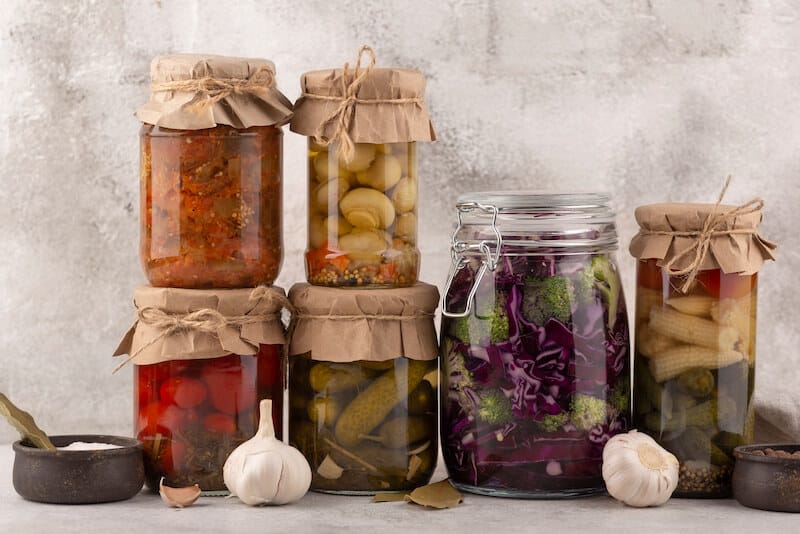Sauerkraut, sourdough bread, pickles, Gruyère… Whether they are traditional culinary staples or trendy new recipes, fermented foods are fantastic allies for our health. While their benefits are widely recognized today, they come in many forms and varieties. Here are five examples!
The fermentation of food is an ancient preservation method. However, beyond its practicality, it has gained recognition for numerous other benefits, particularly regarding our health! From eczema to constipation, liver health to skin regeneration, the positive effects of fermented foods are plentiful. Here’s the breakdown.
What Are The Health Benefits Of Fermented Foods?
Fermentation offers numerous health advantages. By breaking down sugars and starches, it eases digestion. The enzymes produced during fermentation effectively pre-digest the food, making it gentler on the intestines.
Moreover, this process fosters the growth of beneficial bacteria, such as probiotics, essential microorganisms that support oral, intestinal, and vaginal microbiomes.
And that’s not all! Fermentation also enhances the vitamin content of foods. For instance, a fermented vegetable is significantly richer in vitamins than in its raw form.
In short, fermentation is a valuable ally for smooth digestion and overall health!
Is Sauerkraut Detoxifying?
Often considered heavy and hard to digest, should we reconsider the famous Alsatian dish? The issue may lie more with the accompanying charcuterie. The cabbage, in fact, is a significant source of vitamins and probiotics, a delight for the body! Raw cabbage, already high in vitamin C, becomes even richer when fermented. Thus, it’s the perfect dish for indulging while staying “healthy.”
How To Ferment Vegetables: The Pickling Technique
Pickles are the most recognized fermented vegetables. But did you know that this technique can be applied to various other vegetables? You can choose carrots, cauliflower, radishes, mushrooms, or be even more inventive. Pickled vegetables make a great addition to salads, side dishes, sandwiches, or burgers, accommodating all culinary cravings.
What’s more, making these pickles yourself is pretty straightforward. All you need is a sealed jar, water, vinegar, salt, and vegetables (organic is even better). Once prepared, keep the jars at room temperature and let the magic happen. After a few days, the vegetables will be fermented and ready for enjoyment. Once opened, remember to store the pickle jar in the fridge.
Kombucha: The Detox Alternative To Sugary Drinks
This tart, sparkling tea is a trendy fermented beverage! Despite its distinctive taste, which isn’t for everyone, kombucha serves as a detoxifying remedy worth knowing. Many recipes are available for home preparation, but kombucha is increasingly available in stores and makes for an excellent alternative to sodas.
Is Sourdough Better Than White Bread?
Unlike white bread, the flour used for sourdough is fermented. This distinction affects the health benefits that this type of bread provides. The microorganisms, minerals, and vitamins found in sourdough enhance its digestibility and reduce its caloric content. Furthermore, the fermentation process makes sourdough more nutritious than conventional bread.
Popular Fermented Cheeses: Feta, Gruyère, Gouda
While fermented cheeses are undoubtedly high in calories, they offer numerous health benefits, notably due to their probiotic content. It is advisable to incorporate these cheeses into your diet, albeit in moderation!
Keep in mind that not all cheeses are fermented. Among the fermented cheeses that are widely enjoyed are feta, made from goat and sheep’s milk; Gruyère, a Swiss cow cheese; and Gouda, which comes in various flavors including cumin and cloves.
Fermented foods, beneficial for health, are accessible to everyone: it’s up to you to include them in a varied diet!
Good To Know
The fermented foods mentioned in this article are typically French, but many cultures have included fermented foods in their diets. Examples include Asian specialties like miso (fermented soybean paste), kimchi (a mix of fermented vegetables and spices), and sake (fermented rice alcohol).







